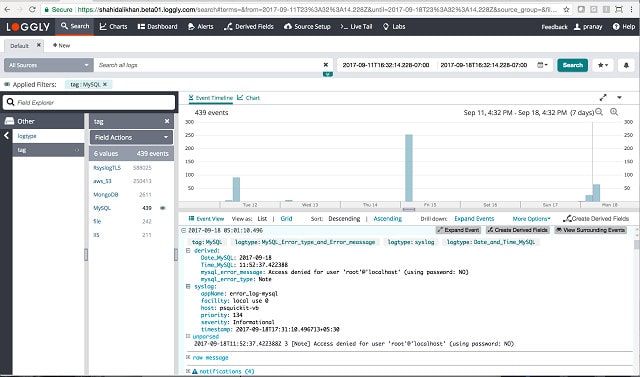

LogSpout is a log router for Docker containers that runs inside Docker. We can ship logs from all our containers with the project called logspout. Luckily, we still did not exhaust all our options. However, we managed to get thus far without changing the default daemon configuration and I’d prefer if we can continue working without involving any special provisioning tools.
#Docker syslog logstash driver
If we were to choose between setting a driver when creating a service or as the daemon configuration, I’d choose the later. After all, there are probably fewer servers than services. That would certainly make the setup easier. We could specify a log driver as a configuration option of the Docker daemon on each node. Let’s see if there is another option to accomplish the same result. However, using the argument for each service is tedious and, more importantly, we could easily forget to specify it for a service or two and discover the omission only after we encounter a problem and are in need for logs. That would solve our log shipping problem. The driver could be syslog or any other supported option. We could use -log-driver argument to specify a driver for each service. How can we forward logs from all the containers no matter where they’re running? One possible solution would be to configure logging drivers.
#Docker syslog logstash how to
We are, finally, ready to explore how to ship logs from our Swarm services to LogStash, and from there ElasticSearch. Logstash 1/1 logstash:2.4 logstash -f /conf/nf Swarm-listener 1/1 vfarcic/docker-flow-swarm-listener The output is as follows (IDs are removed for brevity). We should have a few services running inside the Swarm cluster. Now that the production cluster is up and running, we can create ELK services. HOSTNAME STATUS AVAILABILITY MANAGER STATUS

The output of the node ls command is as follows (IDs are removed for brevity). Let’s confirm that the cluster was indeed created correctly. We cloned the cloud-provisioning repository and executed the scripts/dm-swarm.sh script that created the production cluster. That way the commands you’ll see throughout the book will be same as those that should be executed on OS X or any Linux distribution. The recommendation is to run all the examples from Git Bash (installed through Docker Toolbox as well as Git).
#Docker syslog logstash code
Therefore, please make sure that the code is cloned inside one of the user’s sub-folders. Docker Machine makes the whole directory that belongs to the current user available inside the VM. Some of the files will be shared between the host file system and Docker Machines we’ll create soon. If you don’t, I suggest you read the Docker Swarm Introduction (Tour Around Docker 1.12 Series) article or fetch The DevOps 2.1 Toolkit: Docker Swarm book. I will assume you already have at least a basic knowledge how Docker Swarm Mode works and that you know how to create Docker services. We’ll start by creating a Docker Swarm cluster. Once in the database, they will be available through Kibana. They’ll be forwarded from containers to LogStash and, from there, to ElasticSearch. docker run -it -rm -name=logstash -p 5000:5000 -v /path/to/nf:/usr/share/logstash/config/logstash.yml /logstash/logstash:7.14.In this article, we’ll discuss a way to forward logs from containers created as Docker Swarm services inside our clusters. The below two commands will display the hello-world container logs in logstash. You can simply get your container logs by configuring Logstash as follows and running the container whose logs are to be viewed by changing its default log driver to syslog.

Docker includes multiple logging mechanisms to help you get information from running containers and services by means of logging drivers.Įach Docker daemon has a default logging driver, which each container uses unless you configure it to use a different logging driver.


 0 kommentar(er)
0 kommentar(er)
